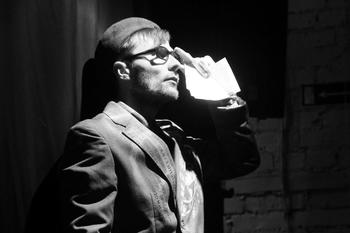Roman Osminkin
Dorothea Schlegel Artist-in-Residence
Research Area 1: "Competing Communities"
November–Dezember 2022
Anti-War Russian-Language Poetry and Poetic Communities of Wartime
"Poetry will not save the world and never could save it. Poetry is needed to sing the last lullaby on a freshly dug grave. Poetry is needed in order to cut off the term of the language at the last terrible aesthetic judgment for the crimes committed by its speakers. Poetry is needed to imagine a future world without war."
Against the background of the escalation of national-patriotic and militaristic politics in Russia, many literary communities, magazines and poetry circles were demoralized, confused and ceased to meet and publish. War reduces the entire social field to black and white; therefore, during war, subtle differences in language and praxis give way to archaic ideologemes: blood, soil, fate and the binary logic of good/evil, true/false. Poetry is not free from historical conditions and the power of grand narratives. In the Russian-speaking segment, poetry acquires relevance not only as 'mapping the catastrophe' and working with the 'trauma of the witness', but also as a certain communicative practice and an alternative place for assembling communities that have lost their former geographical and existential foundations. The surge of Russian-language anti-war poetry taking place in 2022 speaks to the growing need for poetic communication and community, which could at least temporarily become a 'refuge' from the total propaganda of violence and state terror. Readings of anti-war poetry are being organized on- and offline, street poetry is spreading, many author channels have been set up on Telegram, researchers and poets themselves are compiling collections and publishing online magazines and zines (the so-called underground 2.0). Poetry is even being written and read by those who work in related fields or who previously had little contact with it.
As a practitioner and theorist of poetry and literature, Roman Osminkin is interested in the nature of this demand for poetry during global crises, as well as the demand for a new language and new principles for the formation of poetic communities. At the same time, he is part of the Russian-speaking sphere and thus responsible for what is written and spoken in Russian, including Russia’s aggressive policy towards Ukraine and other post-Soviet countries.
At the Temporal Communities Cluster of Excellence Roman Osminkin would like to study in more detail several poetic communities in which he was directly involved, as well as other communities that arose after the exodus of many Russian poets to neighbouring countries. Hishypothesis is related to the fact that poetry is becoming a gathering place for communities of poets and activists who have lost their former places of residence. The language of poetry offers a 'soft' alternative to the toxic machine of propaganda and violence and fulfils the need for coexistence, which was exacerbated during the military dictatorship in Russia. If the historical avant-garde forcibly deformed language and conceptual poetry deconstructed large discourses, then contemporary poetry can become – and is already becoming – a non-violent practice of creating 'language shelters'. New poetic communities are increasingly built not on cultural traditions or affectations of transgression, but on empathy, mutual care, solidarity and an atmosphere of trust. For the younger generation of poets, the ethical and political dimension of language and the ethos of the community are inextricably linked with poetics.
Roman Osminkin is a Saint Petersburg-based poet, theorist of art and literature, writer, playwright and performer. As a poet, artist and critic, Osminkin works with monumental ideological strata: communism, liberalism, war, nationalism, fascism, imperialism, religion, etc. In this sense, he continues the tradition of conceptualism and the great Russian conceptual poets such as Dmitri Aleksandrovich Prigov (1940–2007). Like Prigov, Osminkin is also a performer working between music and the spoken word, but at the same time he has politicized the techniques of post-conceptualism towards activism and leftist emancipatory practices. He does not simply deconstruct ideologemes at the structural level of language, but develops a method of 'embodied knowledge', where ideology penetrates our bodies and writing. He is interested in how ideology reproduces itself through everyday praxis and social media algorithms. In recent years, Osminkin has been developing a method of autoethnography (DIY ethnography). In collaboration with the artist and writer Anastasia Vepreva, he wrote the book Kommunalka on Petrogradka, the result of four years of communal cohabitation with people of different social strata. He is currently working on a book about collective performance, studying different communities of activists, artists, poets and citizens. The main thesis is that communities are (re)produced in a performative way, and any social and artistic action involves the collective agency of a multitude, including non-human agents. At the same time, Osminkin is writing the auto-fictional novel Olechkin's Intuition based on his dialogues with his Ukrainian mother, who moved to Leningrad from a village in the Zhytomyr region and absorbed all the contradictions of the Soviet system.
